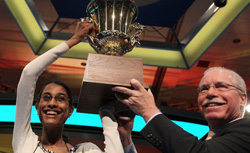How Would You Do at the National Spelling Bee?
Take our test and find out.
Last night, Sukanya Roy, a 14-year-old from Pennsylvania, won the 84th annual Scripps National Spelling Bee by correctly spelling cymotrichous, a Greek-descended word meaning "having wavy hair." Are your orthographic skills better than an eighth grader's? Try our mock spelling bee and find out.
Each word in the quiz below won some lucky kid the grand prize in a past bee. Click on the audio player to hear the word pronounced. Need a hint? Click and drag your cursor over the [bracketed] area to reveal the word's part of speech, definition, use in a sentence, language of origin, and, finally, its spelling.
Except where otherwise noted, definitions and word origins are taken from Webster's Third New International Dictionary, the official lexicon of the bee. Good luck, and let us know how you do in the comments!
Part of speech: [noun]
Definition: [an instrument "designed to measure the amount and speed of blood flow through an artery"]
Sentence: [The researchers used a --- to determine whether the experimental drug was having an effect on the animals' cardiovascular health.]
Language of origin: [German]
Spelling: [stromuhr]
Part of speech: [adjective]
Definition: ["lukewarm or indifferent in religion or politics"]
Sentence: [My --- father never cared much if I skipped church.]
Language of origin: [Latin and Greek]
Spelling: [Laodicean]
Part of speech: [noun or transitive verb]
Definition: [noun: reward, recompense; verb: reward; "to be a recompense for"]
Sentence: [Whenever I did well on a spelling test, my mother gave me a dollar as a ---.]
Language of origin: [Middle English, from Middle French]
Spelling: [guerdon]
Part of speech: [ noun ] Definition: ["a small forceps for clamping a blood vessel" ] Sentence: [ Holding the scalpel with her left hand, the doctor clipped the artery with the --- in her right hand. ] Language of origin: [ French ] Spelling: [ serrefine ]
Part of speech: [noun]
Definition: ["a parent language, especially one reconstructed from the evidence of later languages"]
Sentence: [Germanic is the --- of many West-European languages.]
Language of origin: [German]
Spelling: [Ursprache]
Part of speech: [noun]
Definition: ["an accessory embellishing note or tone preceding an essential melodic note or tone"]
Sentence: [On sheet music, an --- is usually indicated with a note of smaller size.]
Language of origin: [Italian]
Spelling: [appoggiatura]
Part of speech: [adjective]
Definition: [indigenous or native, especially plants or animals]
Sentence: [The birdwatcher was astonished to see a cockatoo in the forest—he did not think the creatures were --- to that region.]
Language of origin: [Greek, according to dictionary.com]
Spelling: [autochthonous]
Part of speech: [adjective]
Definition: ["indifferent, nonchalant"]
Sentence: [When I fell down in the subway car, the other passengers remained ---, as if this was a common occurrence.]
Language of origin: [Italian]
Spelling: [pococurante]
Part of speech: [noun]
Definition: ["one that succeeds to the place of another; substitute"]
Sentence: [When I ran out of Advil, I took a Tylenol as a ---."]
Language of origin: [Latin]
Spelling: [succedaneum]
Part of speech: [noun]
Definition: [course of action, maneuver (particularly in a diplomatic context); a diplomatic statement; a "statement of views to a public official"]
Sentence: [When the mayor would not meet our demands, we issued a --- to the local newspaper.]
Language of origin: [French]
Spelling: [demarche]
Part of speech: [noun]
Definition: ["pathologically excessive and often incoherent talkativeness"]
Sentence: [Her --- prevented her from making friends, since no one could ever get a word in edgewise.]
Language of origin: [Greek]
Spelling: [logorrhea]
Part of speech: [noun]
Definition: ["a name well-suited to the person, place, or thing named"]
Sentence: [Melody was indeed a ---, because she sang like a bird.]
Language of origin: [Greek]
Spelling: [euonym]
Part of speech: [noun]
Definition: ["the act or practice of burying alive"]
Sentence: [Stephen was both claustrophobic and afraid of death; consequently, his nightmares always involved ---.]
Language of origin: [Latin, according to dictionary.com]
Spelling: [vivisepulture]
Part of speech: [noun]
Definition: ["yellow discoloration of the skin from abnormal causes"]
Sentence: [Maintaining a healthy cholesterol level can help reduce the risk of developing ---.]
Language of origin: [Latin]
Spelling: [xanthosis]
